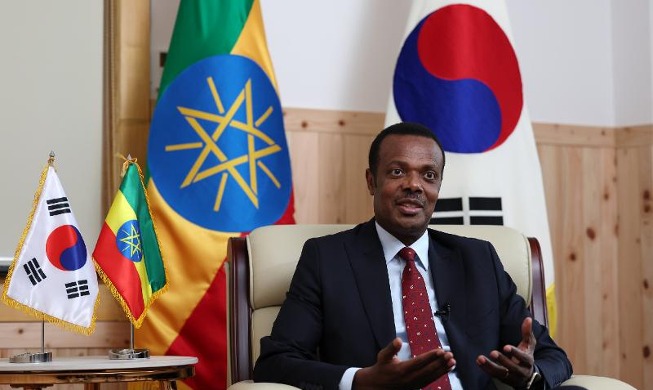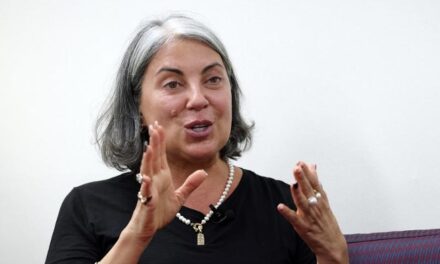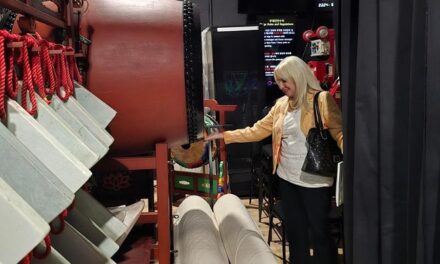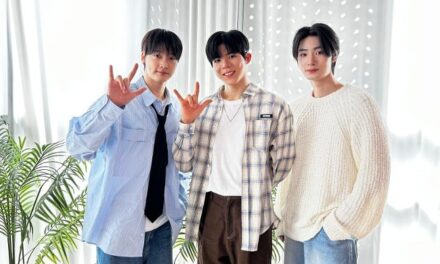Ethiopian Ambassador to Korea Dessie Dalkie Dukamo on May 2 at his embassy in Seoul’s Seongbuk-gu District says the upcoming Korea-Africa Summit will be “a historic event” for Korea and all African nations.
By Yoon Sojung with contribution from Kim Lena
Photos = Jeon Han
Video = Jeon Han, Lee Jun Young and Park Daejin
Ethiopian Ambassador to Korea Dessie Dalkie Dukamo has high hopes for the inaugural Korea-Africa Summit from June 4-5 in Seoul, calling it “a historic event” for both sides.
He called the event a very good opportunity for African countries to learn more about Korea’s strategic areas and share its economic development experience.
Calling both countries “blood brothers,” Ambassador Dukamo proudly said bilateral
ties began with Ethiopian participation in the Korean War in 1951 launched Korea’s relationship with Africa. This, he added, was the key to the continuous development of relations.
“Ethiopia has the second-largest population in Africa and is the gateway to East and West Africa,” he added. “While working here, I wish to make bilateral trade volume grow more than that of 2021, when Korean exports to Ethiopia hit a record high despite the COVID-19 pandemic.”
The following are excerpts from the May 2 interview with the ambassador at his embassy in Seoul’s Seongbuk-gu District.
Korea and Ethiopia last year marked the 60th anniversary of diplomatic relations. What has made both sides so close?
The two countries forged diplomatic relations in 1963, 10 years after the end of the Korean War. But bilateral ties began earlier with Ethiopian participation in the Korean War in 1951. Both sides have since boosted cooperation in a wide range of sectors.
We consider Korea a blood brother. Ethiopia is one of two African countries that participated in the Korean War and the only African nation to send soldiers to Korea. All of Korea’s cooperative partnerships with African states began from cooperation between Korea and Ethiopia. More than 6,000 Ethiopian soldiers bravely fought for South Korea in the war and won all 253 battles they took part in. We had 121 war dead without a single hostage.
The rise of bilateral trade saw Korean exports to Ethiopia in 2021 hit a record high. What has fueled such growth despite obstacles like the COVID-19 pandemic?
This is because of rapid development of the Ethiopian economy driven by its economic development initiative. In the process of economic development, demand for Korean products increased. There are three main reasons for this. First, demand for Korean products soared during rapid development of the Ethiopian economy such as infrastructure development.
Next, exports of quality Ethiopian agricultural produce such as coffee grew. Ethiopia is known as the world’s birthplace of coffee, namely Arabica coffee. Many Koreans love coffee so their demand for Ethiopian coffee naturally grew, which increased Ethiopia’s exports. Other Ethiopian agricultural exports such as sesame seeds also rose.
Another important factor is advances in transportation. Ethiopian Airlines is the only African air carrier that flies directly to and from Incheon International Airport. So I would say development of transportation for both people and cargo greatly helped exports grow.
What joint projects are both countries working on in Ethiopia? Which sectors does Ethiopia wish to expand cooperation in with Korea?
The Ethiopian government has worked hard on reform to boost its economy. We’ve focused on five select strategic areas: manufacturing, agriculture, minerals, tourism, and information and communications technology (ICT). Korea has collaborated with us in manufacturing, textiles, steel and electrical systems, and this will further expand.
Korea has also supported sectors in Ethiopian agriculture, ICT and health. Both countries also work together in developmental cooperation for rare and critical minerals such as lithium and cobalt, which are widely used in industralization. Korea’s Saemaul Undong (New Community Movement) is also helping Ethiopia through sharing Korea’s experiences in economic development.
Seoul in June will host the inaugural Korea-Africa Summit. What does Ethiopia expect from this event?
The summit will be a historic event for all in offering a very good opportunity for African countries to learn more about Korea’s strategic areas and share Korea’s experience of economic development. Sharing Korea’s know-how in economic development is important for the world as well as Africa. High-ranking officials will soon visit Korea for the gathering. I hope both sides expand cooperation thanks to the upcoming event.
Ethiopia is dedicated to peace not only in Korea but also to the peace and independence of all its African neighbors. This is why Ethiopia holds historical significance in Africa as the center and heart of the continent. Addis Ababa is where international organizations such as the United Nations and European Union have their African regional offices.
Considering its geographic and historic importance, Ethiopia is at the center of Korea-Africa and economic cooperation. Ethiopia has the second-largest population in Africa and is the gateway to East and West Africa. Most Ethiopians are young, which is good for business for Korean companies. Thanks to advanced connectivity backed by well-developed transportation, I believe that bilateral cooperation will be further bolstered.
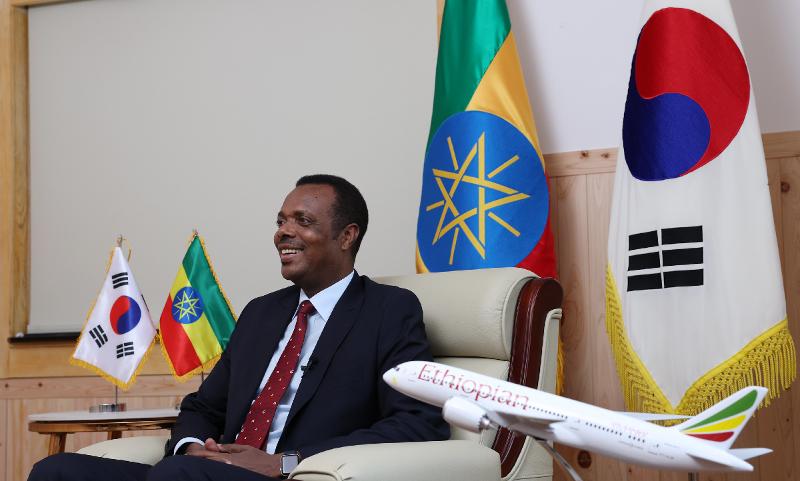
Ethiopian Ambassador to Korea Dessie Dalkie Dukamo on May 2 says higher trade volume between Korea and Ethiopia partly stems from advances in transportation and connectivity backed by Ethiopian Airlines, which has direct flights to and from Incheon International Airport.
Korea will expand scholarships and other projects for the descendants of Ethiopian veterans of the Korean War. How have both sides preserved the legacy of their solidarity that began with Ethiopian participation in the conflict?
First, I thank the Korean government for its projects for Ethiopian war veterans and their descendants like building a memorial hall in Chuncheon, Gangwon-do Province. Such projects such as building the hall and operating veterans’ associations in both countries help strengthen the bond between the people of both countries.
Korea has also offered scholarships not only to veterans’ descendants but also regular Ethiopians. I hope that these projects continue to boost not only bilateral cooperation but also solidarity between the people of the two countries.
What aspects of Ethiopian culture, food or tourism would you recommend to Korea.net readers?
Ethiopia is known as an ancient country with historical uniqueness even among its African neighbors. This is where the history of humankind and fossils of Lucy, (one of the oldest human ancestors), were discovered. Ethiopia has many well-known historical churches as well as mosques, showing uniqueness and charm as a tourism attraction.
Ethiopian cuisine is also different from European food. Well-known Ethiopian dishes include injera and doro wat. Injera is made from teff flour, a gluten-free Ethiopian crop, and has a unique spongy-like texture. Doro wat is steamed chicken roasted with butter with a variety of spices.
Our moderate temperature is 20 degrees Celsius with no winter, so every season is good for visiting. The best time to come is September as it’s very beautiful and similar to the cherry blossom season in Korea. Timket, an Orthodox Christian celebration of the Ethiopian Epiphany, is held every January, an event so famous that UNESCO listed it as World Heritage.
You assumed your post in Seoul in 2022. What do you hope to accomplish here?
My aspiration while in Korea is to further develop and strengthen relations and cooperation between the two countries. I wish to attract more Korean investors to Ethiopia and raise bilateral trade volume to more than that of 2021. I’ll do my best to expand exchanges in people, culture, and science and technology and boost investment between both countries.
arete@korea.kr

